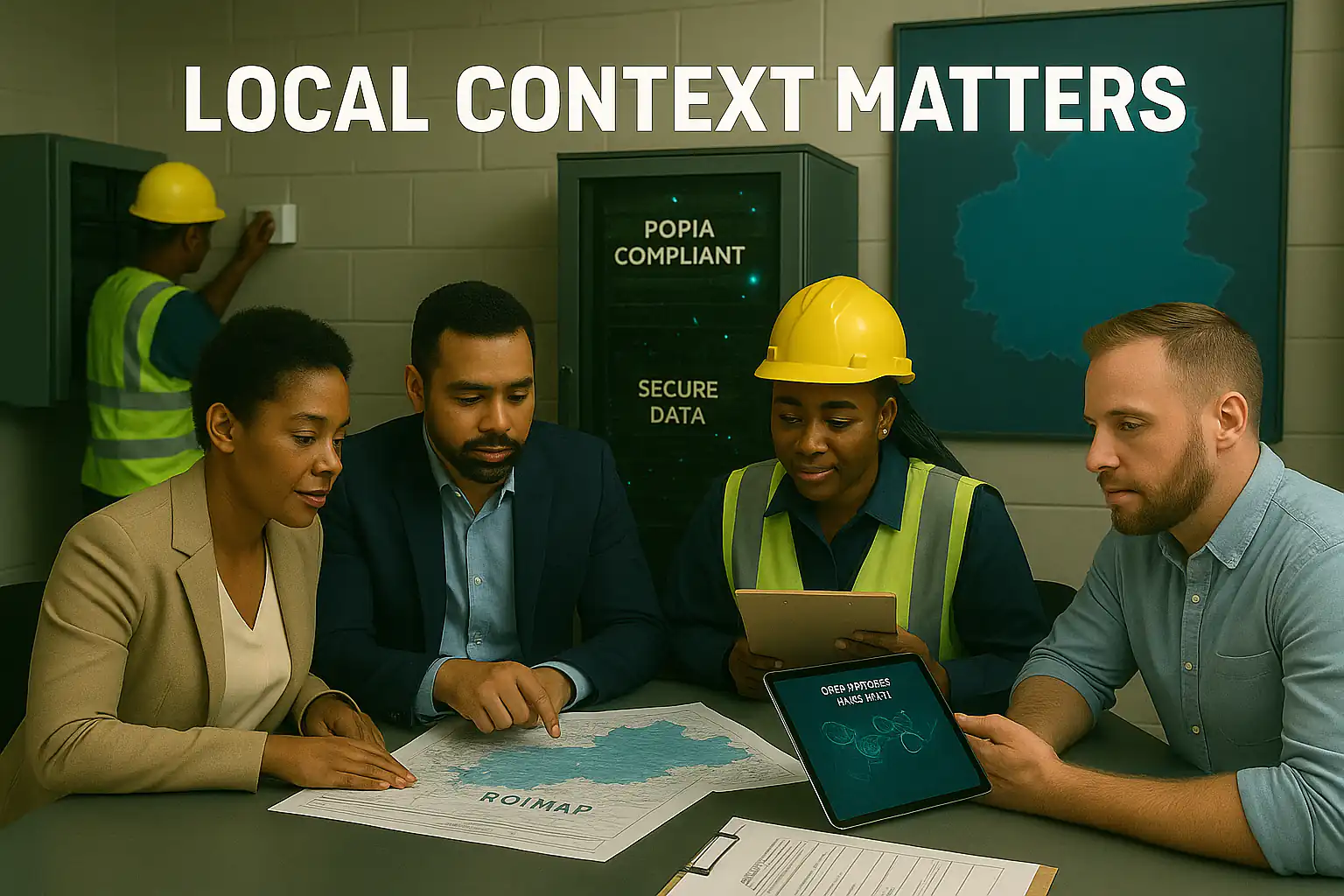Build With an AI Integration Company in Johannesburg
Build reliable, secure AI that scales - from custom integrations across Gauteng to enterprise-grade agents in Johannesburg.
We are your AI integration company in Johannesburg. We build secure, scalable solutions that respect POPIA and your operations.

Why Local AI Expertise Matters
South African teams are moving fast on AI. Yet speed alone does not create durable value. Local context matters - language variants, business process norms, latency and connectivity realities, and POPIA-driven data sovereignty. A partner you can meet in Sandton, audit on-site in Germiston, and support in Roodepoort or Boksburg reduces risk and accelerates ROI. Market signals back this up. About 35% of local companies already integrate AI into operations, which raises the bar for grounded, region-aware delivery (Daisy Business Solutions, 2025).

Compliance and Data Sovereignty
POPIA-compliant architectures keep PII within South Africa. Teams design for consent, access control, and auditability from day one.
Latency and On-Site Operations
Edge and hybrid patterns reduce latency. On-site discovery in Gauteng uncovers constraints early, so pilots convert to production faster.
A Local Partner That Delivers Outcomes
We scope for real-world constraints, not lab demos. We run discovery in Sandton or Randburg, data workshops in Edenvale, and on-prem model reviews where needed. This mix shrinks deployment friction and shortens feedback loops for production success.
Benefit 1: Faster Time to Value
- In-person discovery and data audits improve requirements and reduce rework.
- POPIA-aware designs avoid late-stage compliance rewrites.
Benefit 2: Lower Risk at Scale
- Production-ready MLOps, with versioning, drift detection, and rollback.
- Security reviews, role-based access, and encrypted data flows.
Core Features
We operate as a modular, vendor-agnostic partner - from pilot to production. Assemble only what you need, then scale as outcomes grow.
Feature 1: Integration and MLOps
- Systems integration for ERP, CRM, BI, and legacy systems with ML and LLMs.
- Managed MLOps: versioning, drift detection, SLAs, and on-call engineering for Gauteng workloads.
Quick example: add smart customer routing to an existing contact centre in 8 to 12 weeks. Integrate with local telephony platforms and CRM tools to lift first-contact resolution and reduce handle time.
Feature 2: Agents and Enterprise-Grade Scale
- Conversational, workflow, and decision agents tuned for local languages and accents.
- Enterprise governance: RBAC, encryption, audit trails, and multi-cloud vendor management.
Market context: Microsoft South Africa, AWS, and local integrators enable enterprise AI infrastructure across the region (Nucamp, 2025).
Additional Capabilities
Tailor models, data pipelines, and APIs to your network and hosting preferences. Choose local, hybrid, or on-prem topologies to meet POPIA and governance needs.
Industry-Specific Deliverables
- Finance: fraud scoring tuned to local patterns and regulatory controls.
- Retail: demand forecasting across township networks and mixed-channel data.
- Logistics: route optimisation that reflects Gauteng freight flows.
- Healthcare: clinical decision support with PHI safeguards and auditability.
Agents and Safe Autonomy
- Human-in-the-loop, confidence thresholds, and rollback plans reduce systemic risk.
- Immutable audit logs and regular security testing strengthen trust.
Example: an autonomous support triage agent that categorises tickets, resolves low-risk issues, and escalates with prepopulated diagnostics for human agents.
Proven integration patterns
Practical governance playbooks
Perfect for CTOs, Heads of Operations, and Data Leaders in regulated, high-volume environments
Pricing & Engagement Models
Fixed-scope pilots
- Defined deliverables and acceptance criteria at a fixed price.
Time-and-materials
- Flexible delivery for bespoke data and model work in Gauteng.
Outcome-based tiers
- SLA-driven contracts tied to KPI improvements or managed-service tiers.
Our Process
We balance speed with assurance, so pilots turn into reliable production systems.
Step 1: Discovery & ROI
- 4 to 6 weeks of KPI alignment, data inventory, and risk assessment.
- On-site audits in Johannesburg and across Gauteng.
Step 2: Data Readiness
- 6 to 12 weeks of ingestion, cleaning, labelling, and anonymisation.
- Decide local versus hybrid hosting to satisfy POPIA.
Step 3: Prototype/Pilot
- 4 to 8 weeks. Integrate with production APIs and real teams.
- Define acceptance criteria and rollback plans upfront.
Step 4: Production & MLOps
- Hardened deployments, SRE runbooks, and incident response.
- Load testing under realistic traffic and failure modes.
Step 5: Optimisation
- Scheduled retraining and drift detection.
- Business-led iteration to expand use cases and ROI.
What Our Clients Say
A few words from teams we have supported. Short, honest, and to the point.
“The local discovery sessions cut weeks from our timeline. Compliance reviews were smoother too.”
“Our contact centre saw faster routing and happier customers within one quarter. The rollout felt measured and safe.”
Frequently Asked Questions
Here are direct answers to the most common questions we receive.
How long to deploy an enterprise AI integration?
Typical pilots run 8 to 16 weeks, depending on data readiness and integration complexity. Full production timelines vary by scale and governance needs.
Will my data stay in South Africa?
Yes. Choose local hosting, hybrid, or on-prem deployments to meet POPIA and corporate data residency policies.
What outcomes can I expect?
Expect reduced operational costs, faster response times, and improved customer satisfaction. We baseline KPIs before work and report against agreed targets.
Why Choose Us
POPIA-First Architecture
We embed POPIA controls into design, hosting, and vendor contracts. Your data stays protected and auditable.
Regional Talent and Support
Johannesburg-based engineering, data ops, and security specialists shorten feedback loops and reduce turnover risk.
Proven Market Alignment
35% of South African companies already integrate AI, so local operational knowledge is a true differentiator. For partner validation, review Clutch and The Manifest listings. For enterprise infrastructure context, see Nucamp.
Local story
A Boksburg manufacturer cut unplanned downtime after a predictive-maintenance pilot with edge anomaly detection and scheduled on-site inspections. The project started with a one-day audit and a simple ROI map. Small start, fast evidence, sustainable scale.
Reported example
Energy management tools can trim energy costs by about 20% through demand-shifting and predictive scheduling, as reported by Daisy Business Solutions.
Ready to move from pilot to production?
Book an on-site discovery in Sandton, Randburg, or anywhere across Gauteng.